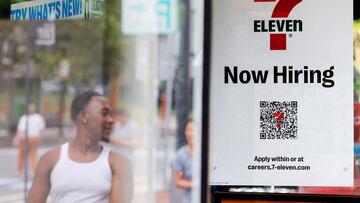How do I file for unemployment and how do I know if I qualify for benefits?
As unemployment ticks up, more people may be turning to unemployment insurance. Here’s who is typically eligible, though each state imposes its own criteria.


Unemployment benefit claims are rising as the national unemployment rate ticks up. The current four-week moving average for continued claims is hovering around 1.68 million, while that for initial claims is closer to 231,000. Earlier this month, the Bureau of Labor Statistics reported that in July, the national unemployment rate rose to 4.3 percent from 3.5 percent a year ago. Though not all those who are unemployed qualify for benefits, when there are sizable increases in unemployment at a macro level, one expects claims to increase. However, depending on where a worker lives determines the ease with which benefits can be claimed (if at all) and the value of those payments. For instance, if you add up all initial and continued claims and compare the number of beneficiaries to the total unemployed population, the level of coverage varies widely by state. In July, 71 percent of unemployed Minnesotans were receiving benefits, compared to 8 percent in Arizona.
To apply for benefits, you will first want to identify the state agency that manages the program where you live, and submit your claim to that office.
Who is eligible to claim unemployment benefits?
Under current law, only those with a fixed contract can claim unemployment benefits since they are required to pay Unemployment Insurance (UI) Tax each month. A fixed contract means you receive a W-2 from your employer when you file your taxes. The taxes you pay each month go into a fund and in the case you become unemployed, they can be withdrawn for a limited number of weeks. You are not entitled to benefits if you are fired for disciplinary reasons. However, if your firing is the result of retaliation, raising concerns about workplace conditions, or organizing one’s workplace, you should speak with the office administrator about the benefits to see what options, including legal paths, you have access to.
For an example from New York, check out the video below.
Can you claim unemployment benefits if you quit?
Paul Sonn, with the National Employment Law Project says that told CNBC that “generally, if you voluntarily resign your job, you’re not eligible for unemployment.”
“It’s not something people who quit their jobs can count on,” explained Sonn. However, there are a few situations wherein a worker who quits would still be able to claim Unemployment insurance. For instance, if someone is forced to quit because the working conditions become so challenging or demanding they may still be able to file a claim. There are a few other circumstances in which an individual might have decided to leave a job and still be eligible to receive unemployment benefits while out of work:
- Medical condition – The rules vary in different states, but most do allow employees with an illness, injury or disability to claim unemployment benefits if their condition is caused or aggravated by the work.
- Domestic violence – In many states, employees who quit work due to reasons relating to domestic violence are able to collect benefits.
- Provide care for a family member – If you leave the workplace to provide care for a family member then you should still be able to claim unemployment benefits. However the rules on eligibility for family members varies greatly between states.
Calls to improve the unemployment insurance system in the US continue
In February, the National Employment Law Project (NELP) released a report addressing what Congress could do to fix the broken unemployment benefit system that millions were forced to interact with in 2020 when more than twenty million workers lost their jobs and had to claim benefits.
A Jobseekers Allowance is a core part of the UI Modernization and Recession Readiness Act sponsored by @RonWyden, @SenatorBennet, + @RepDonBeyer which would #FixUI for a broad range of #workers. pic.twitter.com/KOdnx3SxUK
— National Employment Law Project (@NelpNews) June 7, 2024
Related stories
People found that many of the portals used to make claims were hard to use, often suffered technical failures, and left them unsure of whether or not their claim had gone through. Unemployment insurance was bolstered at the federal level during the pandemic, and that expansion allowed millions of workers to claim or continue claiming benefits.
However, Congress has failed to address the issues that plague these systems, leaving workers vulnerable, particularly if another economic crisis occurs. NELP recommends that Congress reform the benefit extension mechanism so that it is triggered whenever unemployment increases, as this indicates that finding a job may be more challenging. Additionally, the report calls on lawmakers to make it easier for those working part-time but seeking full-time employment to claim benefits, as well as those who quit because they experience sexual harassment or lose access to childcare.
Complete your personal details to comment